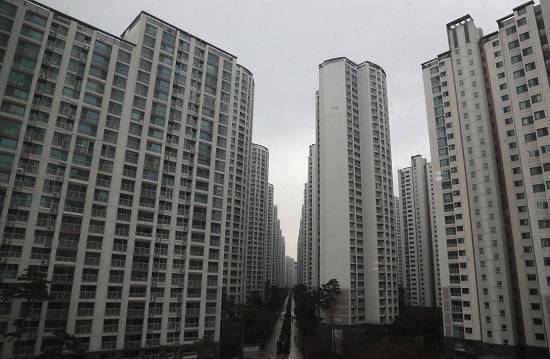On January 24th, the Seoul Housing and Communities Corporation (S.H.) announced that it would strengthen the post-sale system by delaying the sale of houses from the existing 60-80% completion rate to 90%. This comes after a collapse occurred at a new apartment building in Seo-gu, Gwangju, on January 17th and voices demanding the after-sales system were raised. However, the post-sale system cannot prevent poor construction such as that of the Gwangju accident. It also suppresses small and medium-sized construction companies and goes against the pre-housing subscription policy implemented by the government. Therefore, the reinforcement or the full introduction of the post-sales system are choices that should not be made.
First, the post-sale system cannot be a fundamental solution to shoddy construction. Recently this system has emerged as a solution to shoddy construction under the basis that it can prevent rushing construction to fit in move-in times and enable prospective tenants to check the housing quality. Meanwhile, on January 12th, the Ministry of Land, Infrastructure, and Transport cited the collapse of the gang form[1] used at the apartment building construction site as the cause of the accident. Yonhap News Agency analyzed that if the 'Gang Form' was the first cause, additional factors such as poor fixing, concrete load, and strong wind would have caused the accident. The Chosun Ilbo further suggested the possibility that defective ready-mixed concrete was used. As such, accidents by shoddy construction have diverse reasons. In addition, even if prospective tenants can check the apartment directly at the construction site through the post-sales system, it is difficult to accurately determine whether there is a defect. It is hard for ordinary people to examine the site where the construction is still in progress, nor identify if there is a defect in the main structure. Also, most apartment defects occur in the final stages. In January, Lee Eun-hyeong, a senior researcher at the Korean Research Institute for Construction Policy said, "According to the 2015 government audit data, most of the defects in the apartments supplied by the Korea Land and Housing Corporation (L.H.) occurred during the finishing stages of construction." Thus, even with the post-sale system, it is difficult to check the quality of the apartment since the construction is yet incomplete.

Second, it is difficult for small and medium-sized construction companies to survive in the construction industry. If the post-sales system is expanded, small and medium-sized construction companies, which lack a financial base compared to large construction companies, are highly likely to be expelled from the market. The pre-sale system, which is commonly implemented in Korea, starts the sale before the completion of the apartment, and the construction cost can be covered with the down payments and interim payments paid by the prospective occupants. However, in the post-sales system, these same payments cannot be received until a certain completion rate is reached during construction. In other words, construction companies have to raise funds on their own or through bank loans. Accordingly, the difficulties of raising large-scale funds for each apartment complex and the burden of interest are bound to increase. If there are a lot of unsold houses at the time of sale, financial costs from already invested funds will be added. Then, small, and medium-sized construction companies will not be able to survive, resulting in an imbalance in the housing industry. Oh Hee-taek, from the Citizens' Coalition for Economic Justice, explained, "Only large construction companies will be able to participate in the housing projects due to the financing problem." Furthermore, the cost burden of construction companies places a burden on consumers in the housing market. If the cost burden on construction companies increases, the supply of apartments will naturally decrease as it becomes difficult to implement the apartment construction project.
Third, the post-sales system conflicts with a pre-housing subscription which is the recent government policy. A housing subscription is a policy that the government receives an application for some quantity of pre-orders for an apartment. The winner must maintain the qualifications such as owning no other house property or income/asset basis until move-in. A pre-housing subscription is a system that advances the housing subscription period by 1-2 years, and the sale time is even earlier than a housing subscription. The pre-housing subscription was implemented to provide houses for those without their house property, alleviate anxiety, and resolve the imbalance in the housing supply. President Moon Jae-in’s administration promoted the post-sales system, which was President Moon's presidential campaign promise. However, in 2020, before the post-sales system was implemented, as house prices skyrocketed, the government announced that it would conduct pre-housing subscriptions to advance the housing supply period. Pre-housing subscription for private apartments was first implemented in November 2021 and is still taking place. After announcing the plan to implement the post-sales, the flow has changed rapidly due to pre-housing subscriptions, and it has not yet been fully settled. If the post-sale system reappears at this point, it will be difficult to determine the policy direction. As a result, it will not only disrupt the business plans of construction companies but also cause confusion in the overall construction and the housing market.

Currently, there is a movement to strengthen the post-sales system. However, the post-sales system cannot solve shoddy construction accidents as there are many variables at work in the field. In addition, it will increase the financial burden on small and medium-sized construction companies and consumers. Lastly, the post-sales system is in the opposite direction to the pre-housing subscription. If the post-sale system is introduced now, policy contradictions will arise. As such, the post-sales system will cause confusion in the industry and the market rather than positive results. Therefore, the post-sales system should not be fully introduced.
The supporters of the full introduction of the post-sales system argued that the pre-sale system, which has already been implemented, is an unequal contract for consumers, and the post-sales system can solve shoddy construction along with fraudulent sales and can alleviate skyrocketing apartment prices. In contrast, the opposing side argued that the introduction of the post-sales system cannot prevent shoddy construction, aggravate industrial imbalance by burdening small and medium-sized construction companies, and violate the government's policy of pre-housing subscriptions. Considering the social and economic changes that the full introduction of the post-sales system will cause, no decision can be easily made. The government needs to lead the policy considering the consequence the construction field, housing markets, and residents will face.
[1] A big mold used for construction work

